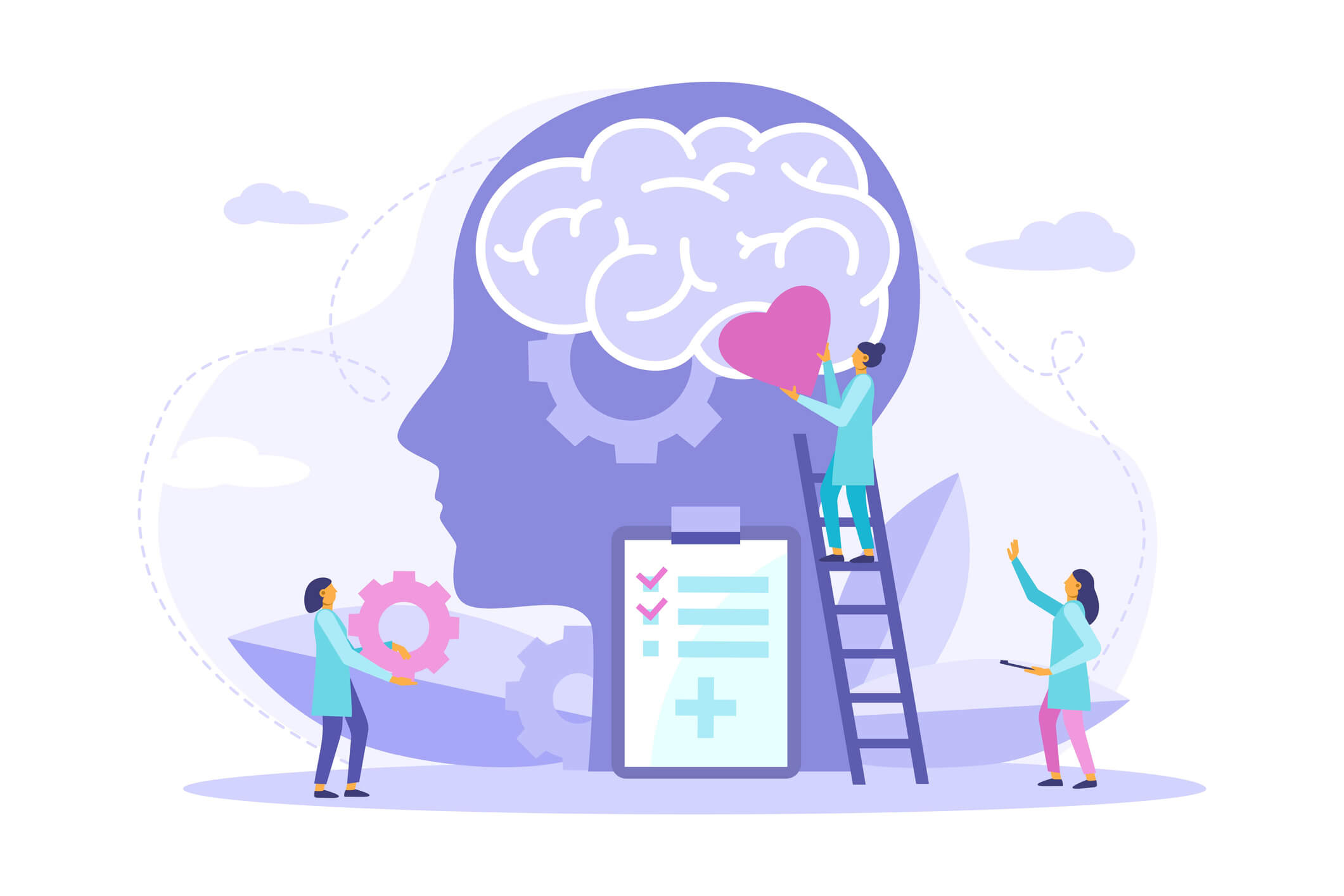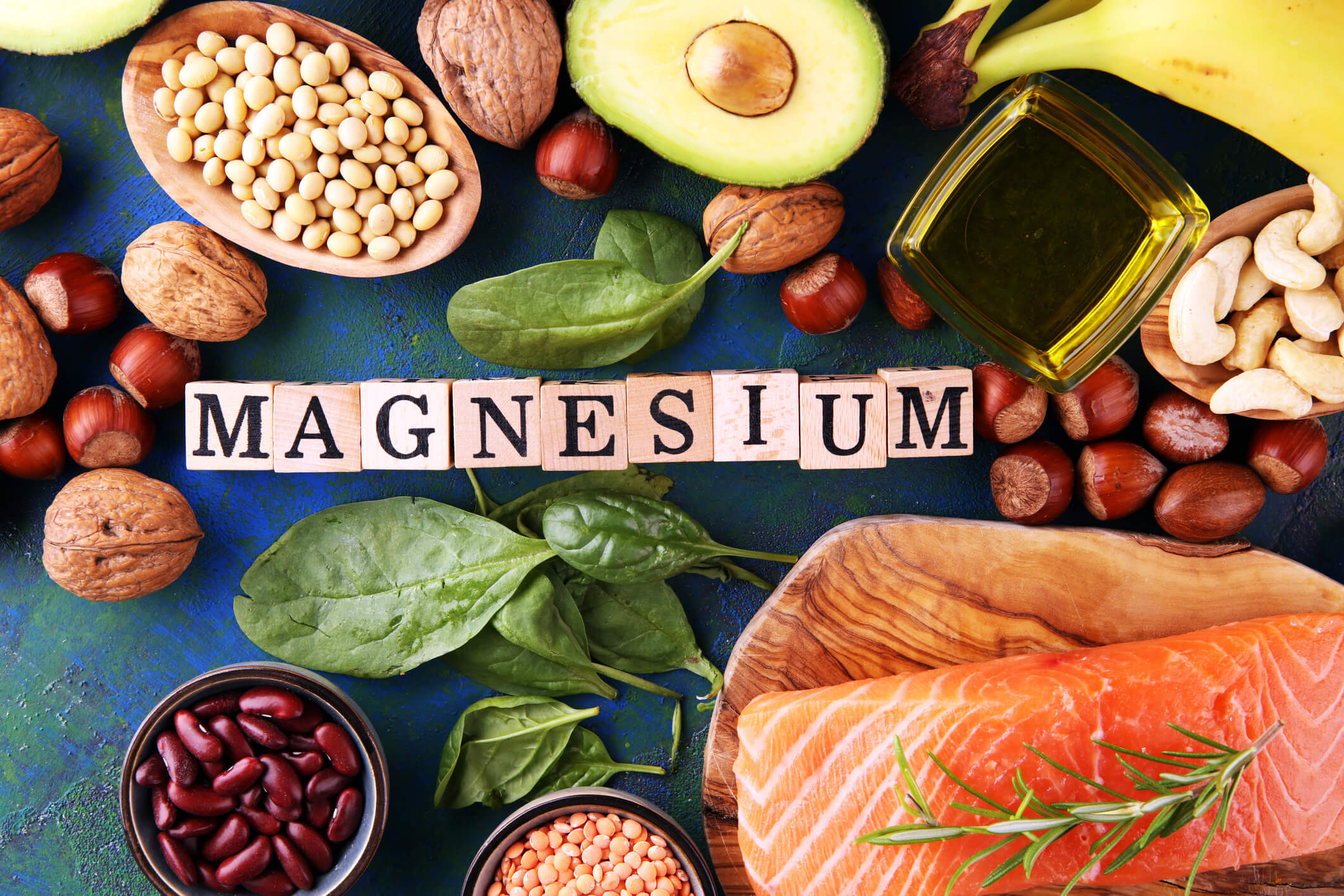Magnesium is an important micronutrient that plays a role in mood and mental health. It helps with depression, anxiety, ADHD, and other conditions. Low magnesium can affect your mood too!
Feeling tense, tight, anxious, or just otherwise–wound too tight? It might be a mineral–magnesium–your mind is missing. And it’s because magnesium plays a starring role in regulating muscle and nerve function.
When we get more of this miracle mineral, we sleep better, have more energy, and it even performs other helpful functions like activating vitamin D. It can be hard to get enough magnesium because it’s not found in most foods (especially processed food) but you can increase your intake both from diet and the right form of magnesium supplementation. Let’s find out how it can help you.
Why do you need magnesium for mental health?
 Magnesium is one the most abundant minerals in your body, just behind calcium. It works with other minerals, potassium, vitamin D, B12, and others to keep you healthy inside and out.
Magnesium is one the most abundant minerals in your body, just behind calcium. It works with other minerals, potassium, vitamin D, B12, and others to keep you healthy inside and out.
It plays a key role in over 300 processes that take place within your cells including helping you to sleep, feel energized and maintain a healthy immune system. Magnesium can also improve symptoms associated with depression, anxiety, ADHD, and other mental health issues.
Low magnesium levels are associated with conditions like insomnia and migraines, as well as metabolic problems like diabetes and heart disease. There is evidence that indicates not getting enough magnesium can also lead to increased feelings of anxiety and depression.
Related: The Link Between Anxiety + ADHD
We’re not getting enough dietary magnesium
“Approximately 50% of Americans consume less than the Estimated Average Requirement (EAR) for magnesium, and some age groups consume substantially less” according to one study examining low magnesium intake in various populations (1).
This means that almost half of all people may be magnesium deficient.
This same study also suggests that adequate magnesium levels for optimal health–and not just to prevent deficiency–are actually much higher than current recommendations (between 300-420 mg/day). And that our human metabolism is actually adapted to a much higher intake–up to 600 mg per day.
Food sources of magnesium in adults and children in the U.S. are often limited, and even though we tend to consume an excess of energy or calories, we’re likely not meeting our micronutrient needs. Food processing also strips vital minerals from food, such as magnesium and potassium.
Shop bioavailable, easy-to-digest magnesium>>>
What are the signs of low magnesium?
Low magnesium is a relatively common occurrence in clinical settings, though it often goes unrecognized since many aren’t aware of the signs or the situations in which magnesium deficiency is a concern.
Fatigue is often the first and most notable sign of a magnesium deficiency. Because it’s a very broad symptom, most people neglect to connect it with low magnesium.
Low magnesium levels may also cause:
- Muscle pain, spasms, weakness, or stiffness
- Eye twitches
- Restless leg syndrome or leg cramps
- Anxiety
- Difficulty sleeping or insomnia
- Panic attacks or anxiety attacks
- Migraine headaches
- Worsening premenstrual cramps
- Irregular heartbeat
Magnesium deficiency has been found in 84% of postmenopausal women with osteoporosis, and in a majority of those with poorly controlled type 2 diabetes. A review of 37 articles concluded that low magnesium was a possible public health concern for older adults (1).
Related: Fight Fibromyalgia with Integrative Medicine
Is Magnesium effective for anxiety?
One of the most abundant minerals in the body, magnesium is involved in about 300 different reactions in the body–many of which regulate mood and your nervous system.

Numerous studies have shown lower magnesium levels associated with different neurological and psychiatric disorders, particularly depression and post-traumatic stress disorder, but also anxiety disorders and bipolar disorder (2).
A 2017 review looked at 18 different studies that showed magnesium had been shown to decrease anxiety in a majority of participants (3).
Magnesium acts on a part of the brain called the hypothalamus and the pituitary. These tissues control the release of stress chemicals which are often at the root of anxiety or panic attacks.
If you suffer from anxiety you may want to include magnesium in a treatment plan to reduce it.
Read more: Holistic Health Modifications Recommended If You’re Dealing with Anxiety or Depression
Does magnesium help with depression?
A randomized clinical trial in 2017 in the Journal PLOS one found that magnesium is effective for mild-to-moderate depression in adults (4). Numerous other studies also show a link between low magnesium and depression.
Since then, a systematic review in 2020 also concluded that magnesium seemed to have synergistic effects when combined with antidepressants to improve depressive symptoms (5).
Read more about the integrative medicine approach to depression.
Magnesium and the brain
One of the key pathways magnesium influences is the glutamate receptor site. Glutamate is an excitatory neurotransmitter that plays a critical role in normal brain functions. In excess, it can create overstimulation of cells which may lead to damage and changes in mood like anxiety or depression.
Magnesium binds to the receptor protein on cell membranes and blocks glutamate from binding there (3). This is what leads to magnesium’s antidepressant-like effects.
Glutamate imbalance can negatively impact ADHD symptoms. Read more about natural strategies here.
Magnesium and sleep
Magnesium also helps regulate the sleep hormone, melatonin, which is the main regulator or circadian rhythm–or your natural sleep cycle. Your circadian rhythm regulates many things, including feeling awake and then feeling tired.
In one study, supplemental magnesium shortened the time it took to fall asleep, lengthened overall sleep time, and reduced early-morning waking in older adults (6).
Many tasks and habits can disrupt your natural circadian rhythm, including exposing your eyes to the blue light at night and stress. If you are trying to optimize your circadian rhythm, you should check your magnesium levels are optimal because they work together to help you get better rest.
Related: Beating Seasonal Depression and Optimizing Circadian Rhythm
Effects of magnesium on stress
Magnesium improves the body’s ability to cope with stress. The effects of magnesium can be seen in better HPA axis regulation, which is the network of tissues that communicate a stress response from the brain to the body, and vice versa. It works as you help your muscles start to relax and digest.
Research has also shown that magnesium supplements help improve glucose metabolism and lower blood pressure, two mechanisms that play a role in how well our bodies handle stress (7).
Save time and maximize benefit with a combination of the 6 most beneficial types of magnesium in one scoop.
Magnesium and vitamin D
If you’re taking a vitamin D supplement, you may not be absorbing it unless you have enough magnesium as well.
We now know that all the enzymes involved in metabolizing vitamin D seem to also require magnesium as well. And that a deficiency in either of these vital nutrients is associated with increased risk of disease, including depression and various metabolic disorders (8).
Shop high-quality magnesium supplements and optimize your vitamin D intake.
What magnesium supplements are best?
There are different forms of magnesium, and depending on where you need the most support one may be more beneficial for your needs.
Magnesium glycinate
Magnesium glycinate may provide added benefits for sleep and stress support. Glycine is an important amino acid that supports neurotransmitter function. Magnesium glycinate is usually gentler on the digestive tract.
Magnesium malate
This is an excellent absorbing form of magnesium. Preliminary research shows that it is very useful for the symptoms associated with nervous system function like fibromyalgia and chronic fatigue. 
Magnesium L-threonate
This form of magnesium is one that might be useful for improving memory. Preliminary research shows that it may increase levels of brain-derived neurotrophic factor or BDNF, a protein in the body thought to support neuron growth and connectivity.
Magnesium sulfate
Also known as Epsom salt baths are an excellent way to get more magnesium topically.
Magnesium oxide
Often useful for sleep, mood support, and stress relief. This form of magnesium is useful for some people, but it has a lower bioavailability and can be more likely to cause digestive upset.
Magnesium citrate
Magnesium citrate is beneficial for mood and overall relaxation. Higher doses may cause a stool-softening effect.
Serenease is an efficient and easy-to-absorb combination of 6 types of beneficial magnesium. Add a scoop of this quickly dissolving powder to any drink or a plain glass of water. No big pills to swallow.
How do I take Magnesium for anxiety?
The best way to take magnesium is with a combination of forms.
You can take it in the morning for energy production and mood support, and then again at night if you need more stress relief or relaxation before bedtime. This is especially useful if you had one or more caffeinated drinks during the day.
For most people, about 300 mg per day should be sufficient, but some people might need more (1).
Magnesium can be taken in a liquid, powder, or capsule form. Some magnesium products, such as Epsom salts, can even be added to your bath water for a soothing transdermal magnesium boost.
Some people may find magnesium is easier to digest when divided into 2 or more doses, adding up to the daily recommended amount. Additionally, you can also up your intake of magnesium-rich foods.
Which foods have the most magnesium?
A varied and nutrient-dense diet provides a substantial amount of magnesium for optimal brain function. You can help boost serum magnesium concentrations with leafy greens, nuts, and other foods, like:
- edamame
- dark chocolate
- pumpkin seeds
- spinach
- almonds
- cashews
- avocados
- black beans
Mood Support with Integrative Medicine at CentreSpringMD
Magnesium is an important mineral that helps maintain a healthy mood. Low levels of magnesium are associated with fatigue, anxiety, and depression. Research shows that adults, as well as children, don’t get enough magnesium and that this may be linked to climbing rates of mood and mental health problems.
You can increase your intake by taking supplements or eating more foods high in magnesium such as dark leafy greens, seeds and nuts, and beans. For those who struggle with sleep difficulties, anxiety, or other issues feeling at ease, CentreSpringMD offers customized treatments and a holistic approach to help you improve your mental well-being.
Resources
- https://openheart.bmj.com/content/5/1/e000668
- https://www.ncbi.nlm.nih.gov/pmc/articles/PMC7761127/
- https://www.ncbi.nlm.nih.gov/pmc/articles/PMC5452159/
- https://www.ncbi.nlm.nih.gov/pmc/articles/PMC5487054
- https://www.ncbi.nlm.nih.gov/pmc/articles/PMC7352515
- https://pubmed.ncbi.nlm.nih.gov/23853635/
- https://www.ncbi.nlm.nih.gov/pmc/articles/PMC5852744/
- https://pubmed.ncbi.nlm.nih.gov/29480918/

